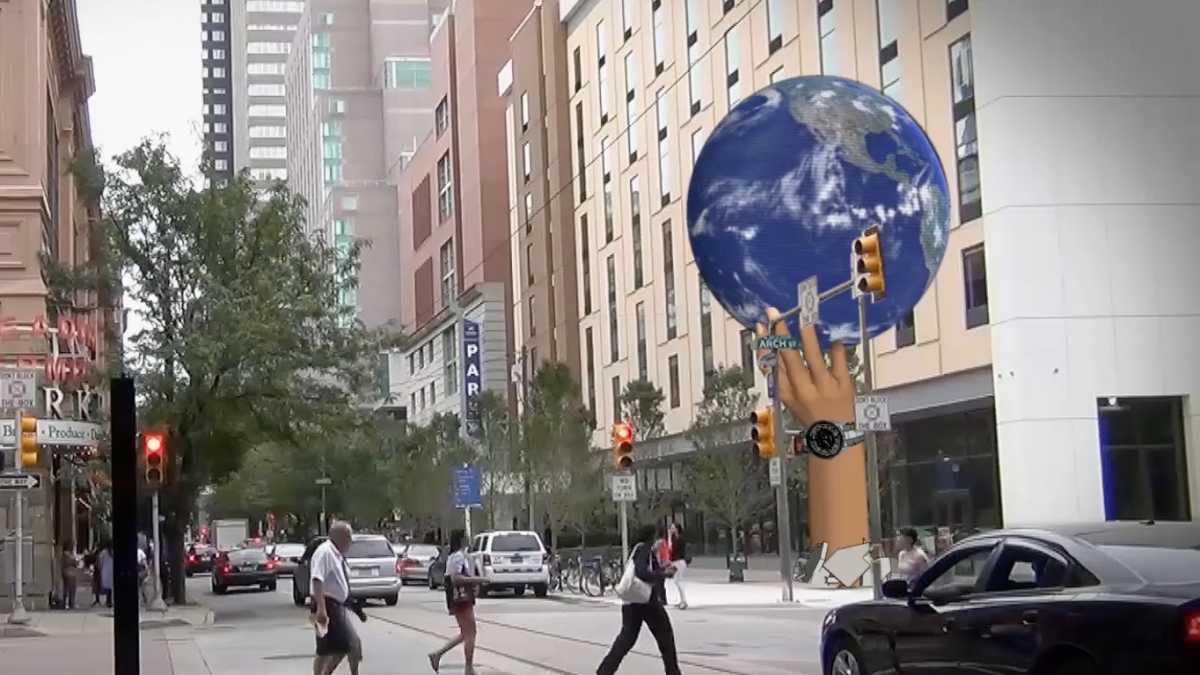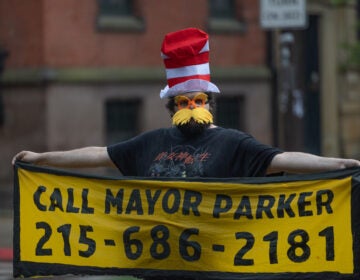Revolving Door Chronicles: Former Councilman lobbies Council for billboard company


On a Tuesday morning late last month, Frank DiCicco was standing in front of an improvised press table in a City Hall courtroom that was in use, temporarily, as City Council chambers, talking with a Council aide about outdoor advertising.
The conversation sounded like cordial, idle chatter: they agreed that digital ads are the way of the future, and they scoffed lightly at local groups that perennially oppose billboards in all their forms.
But it wasn’t altogether idle. DiCicco, the former Councilman for the 1st District who retired at the end of 2011 after becoming embroiled in the controversy over the DROP program, was there on business. Since leaving office, he’s started a lobbying and consulting firm to help clients move legislation through the very institution he once served.
DiCicco’s big client at the moment is Catalyst Outdoor, the advertising firm that’s been pushing for special legislation that would allow the company to build 3-D digital billboards at a few key corners in Center City. The legislation, recommended by Council’s Committee on Rules on that recent Tuesday morning, against the advice of the City Planning Commission, could pass any week now.
Catalyst Outdoor is led by Thaddeus Bartkowski, a billboard magnate who has waged legal battles on municipal zoning codes in surrounding suburbs for years, and who, as the Inquirer pointed out over the weekend, has given almost $10,000 to members of City Council over the past few years.
In teaming up with Catalyst, the former Councilman is in a position to use his relationships on Council to his clients’ benefit, and to his own. Philadelphia city employees who leave office are barred by state law from representing clients who have business before the government body they formerly worked for. The rule is meant to prevent a “revolving door” between the public and private sectors that allows former officials to use their influence for private gain. But the rule goes away after one year.
“[Bartkowski] was referred to me,” DiCicco said in an interview with PlanPhilly on Monday. “We met and talked about his plan and his vision, which I found to be rather interesting. In the world that I live in today, I’m a consultant and I help people with their businesses.”
DiCicco said that he’s always been interested in outdoor advertising as a method for increasing street lighting and generating revenue. He said he helped Bartkowski hone the proposal so that some of the revenue from the three planned signs would be diverted to nonprofit groups in the surrounding areas. He said the amount that each sign would generate—$5.2 million over 20 years—wouldn’t go far in the city’s general fund, but could mean a lot to the smaller groups that help revitalize downtown neighborhoods.
“Thaddeus came to me with this concept,” DiCicco said. “He’s my client—I’m retained by him, so I have a self interest in that regard—but I’m not in any way in a different place now than I was in City Council … If there’s an opportunity to create a reinvestment with Catalyst, I think it’s a win-win.”
Mary Tracy, the director of Scenic America—formerly of the local anti-billboard group known as SCRUB—said that working on behalf of a billboard company is a logical step for DiCicco.
“He’s always been [the billboard industry’s] go-to guy on Council to get things through,” Tracy said. “And he’s very successful.”
Tracy said that she admires Councilman Mark Squilla, who succeeded DiCicco and introduced the bill that would allow the 3-D signs, for being accessible to his constituents and honoring his commitments. But she said he’s too narrowly focused on making sure the proposals he supports benefit some local group or another.
“The problem with [Squilla] is he’s really all about the community benefits,” Tracy said. “… As long as somebody’s getting something out of it, he thinks it’s okay.”
Three-and-a-half years out of office, DiCicco said he misses aspects of being on City Council.
“The thing that really got my juices flowing was development …” said DiCicco, who also represents PREIT, the group that owns the Gallery on East Market Street. “I love watching the city grow and develop to where it is today … so that part of it I miss, but because I’m doing development work for the developers … I’m still close enough to it to be able to have those discussions with the various Council people.”
One thing he doesn’t miss? Dealing with anti-billboard groups.
“We live in a big city,” he said. “You don’t wanna see this stuff? Move to Mayberry.”
“Mary Tracy,” he added, “is going to make [Squilla] lose whatever hair he has left.”
Squilla said on Monday that his office is currently working on amendments to the legislation that limit the height and brightness of the signs—amendments that were recommended by Tracy and her group.
“I wouldn’t say I’m billboard-friendly,” Squilla said. “I would say if we’re going to have advertisement that has any type of impact … I think that community should be able to reap any benefits of that.”
Squilla said his support for the legislation doesn’t have anything to do with his relationship with DiCicco, who approached him to run for the 1st-District seat when he was considering whether to retire.
“Everybody comes up with ideas for legislation …” Squilla said. “And then it’s up to the Council person to decide if they think it’s worthy to move forward.”
DiCicco acknowledged that he made a lot of friends on City Council, and he thinks those friendships help get his clients in the door to make their case. But he said his influence can only take them so far.
“Council will make their own decision,” DiCicco said. “They’re not going to vote this up or down because I’m involved.”
WHYY is your source for fact-based, in-depth journalism and information. As a nonprofit organization, we rely on financial support from readers like you. Please give today.




